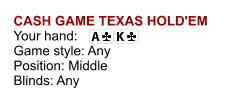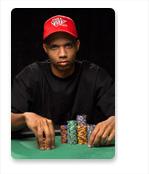Poker Betting Strategy: Pot Limit vs No Limit

Different playing styles and strategies are required for pot limit and no limit poker if you want to win big. Here’s a Texas Hold’em Cash Game example of how to bet in each game format. My next posting will cover no limit and pot limit tournament poker.

WHAT DO YOU DO?
One player limps (flat calls), you make a raise and both the blinds and the limper call. The flop comes down  , and again you bet after the limper checks. Now the small blind calls, the big blind raises and the initial limper re-raises! What do you do?
, and again you bet after the limper checks. Now the small blind calls, the big blind raises and the initial limper re-raises! What do you do?
A lot depends on your opinions of the other players, and how wild they are. Considering this as a possible “deep stack in-the-flesh pot limit” hand and a “short-stacked online no limit hand” throws up divergent possibilities.
POT LIMIT
Against good opposition, you might actually have to throw your hand away. The most likely hand for the limper is 6-6 as he called then called again after you made a raise that was restricted to the size of the pot and the two others came in. That player would then naturally check the flop, letting someone else bet the A or K and re-raising for a massive amount!
It’s likely the small blind has a weaker hand, as in late position he would raise with something very strong to protect the hand, and the big blind could have started with almost anything as he already has money invested, cannot be raised out and was getting very good odds to catch a well disguised hand. The fact that he called could mean he has something along the lines of Ax of hearts.
NO LIMIT
In a short-stacked, no limit game, the format and mobility of your stack means you can raise 10-15% pre-flop should you wish to, and should you think other loose players will call. In such a game you would hope to give a hand like 6-6 bad odds to call, so even if this loose player catches you here in the long term they will lose it back calling with small pairs that miss.
People may well play hands like weak Aces stronger than is advisable in this situation, and could call with any kind of flush draw. So in a wild, short-stacked, no limit game, you would often raise all in to block out draws as far as possible and snare the second best hands, especially if the limper is a maniac or one of the blinds raises instead of him. Even if you end up losing, you have protected your hand well pre-flop and of the other players are so loose and indiscriminate as to put money in with inferior hands, you could end up the winner in the long term.
In my next posting I’ll cover and example of Pot Limit and No Limit betting in Texas Hold’em Tournament play.
Kishan Neilsen
![]() Kishan is a US based online poker professional. Like many online pros, you’ll find him at tables at BetOnline or Bookmaker Poker.
Kishan is a US based online poker professional. Like many online pros, you’ll find him at tables at BetOnline or Bookmaker Poker.



 You’ve probably seen Phil Hellmuth show an opponent the nuts, or Johnny Chan advertise a bluff – but these guys are not your average players…they’re legends!
You’ve probably seen Phil Hellmuth show an opponent the nuts, or Johnny Chan advertise a bluff – but these guys are not your average players…they’re legends!


 Having read and analysed poker books and tips from professional players for years in an attempt to keep building on my own game, some consistent themes keep creeping into the advice for poker play.
Having read and analysed poker books and tips from professional players for years in an attempt to keep building on my own game, some consistent themes keep creeping into the advice for poker play. Here’s a poker article that I could relate to – we’ll probably get slapped around a bit for republishing it – but I thought it was worth sharing.
Here’s a poker article that I could relate to – we’ll probably get slapped around a bit for republishing it – but I thought it was worth sharing. You make a strong raise mid-way through a tournament with A-K and the flop comes A-7-4 rainbow. You bet half the pot and your opponent goes all-in. Do you fold or call?
You make a strong raise mid-way through a tournament with A-K and the flop comes A-7-4 rainbow. You bet half the pot and your opponent goes all-in. Do you fold or call? In a cash game you raise three times the big blind with Aces and get two callers for a flop of 4h-5c-8c. Both check and you bet the pot, after which both call. The turn is 10d, they check and you bet the pot again, one player calls and the other now raises all-in. Do you fold, call, raise or go all-in?
In a cash game you raise three times the big blind with Aces and get two callers for a flop of 4h-5c-8c. Both check and you bet the pot, after which both call. The turn is 10d, they check and you bet the pot again, one player calls and the other now raises all-in. Do you fold, call, raise or go all-in? In the above hand, the last player folds and the player who pushes all-in on the river for two-thirds of the pot when it comes the 7c. Do you fold or call?
In the above hand, the last player folds and the player who pushes all-in on the river for two-thirds of the pot when it comes the 7c. Do you fold or call?
 When it comes to advice about poker, my attitude is very simple: seek it out, absorb it, but while you’re at the table, forget it.
When it comes to advice about poker, my attitude is very simple: seek it out, absorb it, but while you’re at the table, forget it.